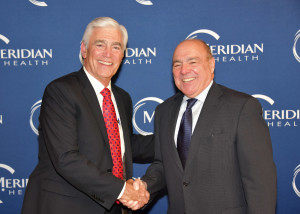
THE MERGER THIS week of Meridian Health System and Raritan Bay Medical Systems means Meridian will expand its reach of services beyond Monmouth and Ocean Counties even further, and for Raritan it comes down to survival.
“Certainly, it means our continuation and our growth,” said Michael R. D’Agnes, president of Raritan Bay Medical Center, located in Middlesex County.
“I think what it means for patients is that we can provide better access to care, we can provide more resources,” according to John K. Lloyd, president of Meridian Health, as it moves beyond its current confines of Monmouth and Ocean counties.
The two, not-for-profit health care providers dried the ink on Tuesday on the merger between them that had been undergoing review and due diligence for months, according to Lloyd.
Meridian’s facilities, which includes among others Red Bank’s Riverview Medical Center; Jersey Shore University Medical Center and K. Hovnanian Children’s Hospital, both in Neptune; Ocean Medical Center, Brick; and Bayshore Community Hospital, Holmdel; draws patients primarily from Monmouth and Ocean counties. Raritan Bay, with facilities in Old Bridge and Perth Amboy, treats patients from Middlesex County, points north in the state as well as attracting some who live in Manalapan, Marlboro and Colts Neck, according to D’Agnes.
“I think what it means for patients is that we can provide better access to care, we can provide more resources,” according to John K. Lloyd, president of Meridian Health, as it moves beyond its current confines of Monmouth and Ocean counties.
The two, not-for-profit health care providers dried the ink on Tuesday on the merger between them that had been undergoing review and due diligence for months, according to Lloyd.
Meridian’s facilities, which includes among others Red Bank’s Riverview Medical Center; Jersey Shore University Medical Center and K. Hovnanian Children’s Hospital, both in Neptune; Ocean Medical Center, Brick; and Bayshore Community Hospital, Holmdel; draws patients primarily from Monmouth and Ocean counties. Raritan Bay, with facilities in Old Bridge and Perth Amboy, treats patients from Middlesex County, points north in the state as well as attracting some who live in Manalapan, Marlboro and Colts Neck, according to D’Agnes.
Meridian, along with its five acute care hospitals, operates approximately 100 ambulatory care service locations in its two counties. “From that viewpoint we pretty much maxed out in terms of what we can provide,” for its current coverage area, Lloyd said.
“We believe to be successful in the future we need to expand geography,” Lloyd con- tinued. “It’s natural for us to look at contiguous counties.”
Raritan Bay Health Services operates two facili- ties, both named Raritan Bay Medical Center, which has about 1,700 employees and 500 physicians on staf f, according to D’Agnes.
For Raritan Bay, which has been operating since 1902, “It has been a very bumpy road for the last five or six years,” in terms of the system’s finances, D’Agnes acknowledged.
“We faced some very diffi- cult times,” in addressing cuts
“We believe to be successful in the future we need to expand geography,” Lloyd con- tinued. “It’s natural for us to look at contiguous counties.”
Raritan Bay Health Services operates two facili- ties, both named Raritan Bay Medical Center, which has about 1,700 employees and 500 physicians on staf f, according to D’Agnes.
For Raritan Bay, which has been operating since 1902, “It has been a very bumpy road for the last five or six years,” in terms of the system’s finances, D’Agnes acknowledged.
“We faced some very diffi- cult times,” in addressing cuts
in federal Medicare and Medicaid reimbursements, providing charity care and addressing the expense of a defined employee pension plan, D’Agnes said.
Mergers are what are happening for hospitals in New
Mergers are what are happening for hospitals in New
Jersey, given the difficulty independent facilities have been experiencing, Lloyd pointed out. Going back 20 to 25 years ago, there were upward of 80 to 90 hospitals operating in the state. Now there are 72, and of those about 75 percent are par t of health systems. Currently there are only 18 independently operating hospitals in New Jersey and those are primarily in more affluent communities, Lloyd said.
This trend is not unique to New Jersey. “This is all about the changes to health care that are happening on the national level,” Lloyd said.
“Really what this means is greater access for our patients and the ability to access capital for the medical center for projects and equipment,” D’Agnes said.
This merger will allow those in the areas traditionally covered by Raritan Bay to draw upon what would be available – such as more extensive oncology and cardiac treatment, pediatric care and surgical sub-specialties, like thoracic surgeries – from Meridian’s network, that weren’t available from Raritan Bay facilities, explained Lloyd and D’Agnes.
This trend is not unique to New Jersey. “This is all about the changes to health care that are happening on the national level,” Lloyd said.
“Really what this means is greater access for our patients and the ability to access capital for the medical center for projects and equipment,” D’Agnes said.
This merger will allow those in the areas traditionally covered by Raritan Bay to draw upon what would be available – such as more extensive oncology and cardiac treatment, pediatric care and surgical sub-specialties, like thoracic surgeries – from Meridian’s network, that weren’t available from Raritan Bay facilities, explained Lloyd and D’Agnes.
“I think it’s a positive,” given the nature of the health care industr y and its economics of scale, observed state Senator Joseph M. Kyrillos Jr. (R-13). “This merger is in the best long-term interest of not only Meridian but Raritan Bay and the people who rely on it.”
For Raritan Bay employees, D’Agnes said, “We don’t antic- ipate any major disruptions,” but employees would come under the Meridian umbrella.
The merger still has to be approved by the state Of fice of Attorney General under the state’s Community Health Care Assets Protection Act (CHAPA). That is expected to take about six to nine months and that approval is needed before the merger is finalized, according to Lloyd.
In addition to this development, Meridian is nearing completion in its talks to merge with Hackensack University Health Network, in northern New Jersey, according to Lloyd, who expects to make that announcement in the coming weeks.
— By John Burton
The merger still has to be approved by the state Of fice of Attorney General under the state’s Community Health Care Assets Protection Act (CHAPA). That is expected to take about six to nine months and that approval is needed before the merger is finalized, according to Lloyd.
In addition to this development, Meridian is nearing completion in its talks to merge with Hackensack University Health Network, in northern New Jersey, according to Lloyd, who expects to make that announcement in the coming weeks.
— By John Burton














